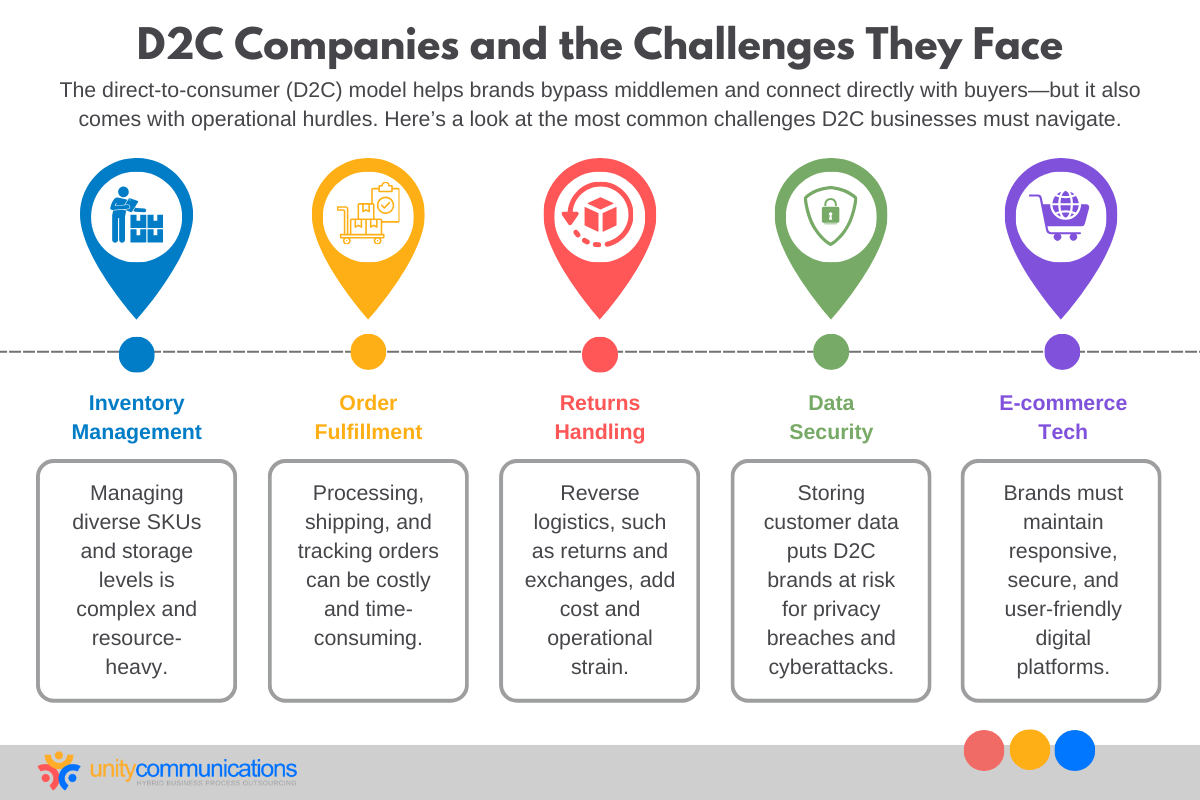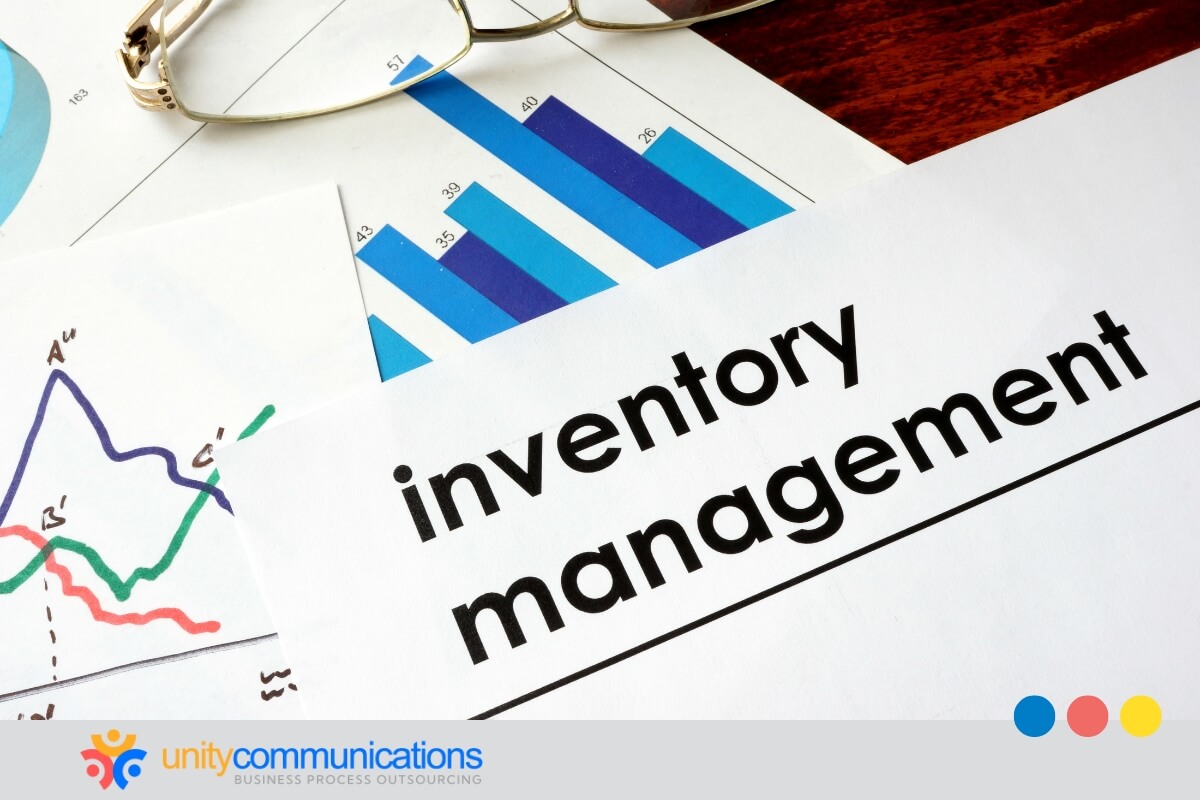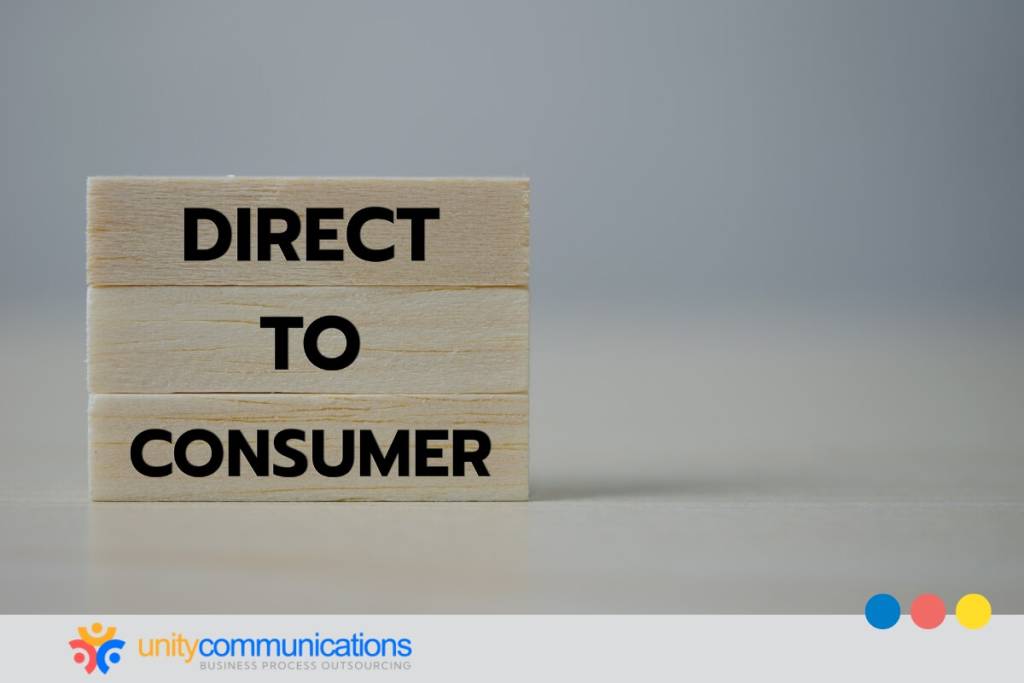IN THIS ARTICLE
Table of Contents
For many companies, selling products directly to customers enables better personalization and increases opportunities to engage potential and existing shoppers. Direct-to-customer (D2C) brands can make more intelligent business decisions by accessing customer feedback or data.
Various industries utilize the D2C strategy—from traditional packaged goods, consumer electronics, and apparel to financial and travel services. Additionally, many D2C companies leverage business process outsourcing (BPO) for different reasons.
This article discusses BPO’s role in the D2C business model and its strategic benefits. Read until the end to learn if BPO is a viable option for your operations.
D2C Companies and the Challenges They Face

The D2C business model allows manufacturers, producers, and brands to sell their products or services directly to consumers from their web stores. Traditional retail products often go from a producer or manufacturer to a wholesaler, distributor, or retailer before arriving at the customer. D2C businesses eliminate the need for middlemen.
The D2C market has grown significantly in the past few years, expanding by almost 45% in 2020. This business model gives brands complete control over messaging and easy access to first-hand customer feedback. It also cuts logistical costs, provides opportunities for higher profit margins, and ensures brand loyalty.
However, many D2C businesses have limited resources. Here are the common challenges they face:
- Inventory management and storage. One of the biggest problems that D2C companies face is managing storage and inventory. Handling more product lines and stock-keeping units (SKUs) makes it challenging to keep track of stock levels and ensure that items are available when buyers need them.
- Order processing, shipping, and fulfillment. Order processing and shipping are two critical components of fulfillment that can be costly and time-consuming for D2C companies.
- Returns management. Returns and exchanges are unavoidable at any e-commerce store, including D2C brands. However, return and exchange management can be a tedious and expensive function.
- Data privacy and security. D2C businesses collect and store customer data, making them targets for cyber threats. Ensuring the security and privacy of customer information is crucial for maintaining trust and compliance with regulations.
- E-commerce technology. Maintaining a user-friendly and secure online platform is essential. D2C businesses must invest in e-commerce technology that provides a seamless shopping experience, mobile responsiveness, and secure payment processing.
D2C businesses face various operational challenges that make it harder to achieve organizational goals. BPO provides a solution for the D2C business model that can help brands overcome operational hurdles and attain success.
Benefits of BPO for a D2C Business Model

BPO companies provide a comprehensive solution for the common challenges associated with the D2C business model. But first, what is BPO? It is subcontracting parts of the operation to an expert third-party provider.
From inventory management and storage to order processing and logistics, BPO firms can help D2C brands reduce costs, streamline operations, and enhance the customer experience. By outsourcing, D2C companies can concentrate on what they do best.
Here are the ways BPO can help solve D2C business challenges:
- Effective inventory management and storage. Outsourcing fulfillment can provide D2C companies with the inventory management and storage they need, ensuring products are in stock and available to ship to buyers.
- Streamlined order processing. Outsourcing can help streamline these functions, minimizing the shipping costs and time associated with processing orders. It enables D2C brands to concentrate on what they do best—manufacturing innovative products and building long-lasting customer relationships—while the BPO handles logistics.
- Efficient return management. BPO firms can help by providing D2C companies with a cost-effective and efficient return management solution. They allow D2C brands to process returns easily and quickly, enhancing the customer experience and minimizing the cost of return management.
- Affordable D2C marketing. From IOS updates and recurring changes to the back-end of ad dashboards, expertise in ad management is necessary for a D2C brand. Many brands will increase customer acquisition costs (CAC) as ad board changes occur, and a BPO partner can help navigate this.
- Better customer service with outsourced email and social media support. Your audience, who reaches out through email or social media, is essential. These are your best customers and ambassadors. You must have an excellent strategy to reach and engage without burning them out. An external customer service and marketing team can help.
- Proper e-commerce ecosystem. Nowadays, creating an adequate e-commerce ecosystem for your company requires more than just a web store. Your BPO partner will develop a cutting-edge web store for you and manage the right ecosystem beyond your storefront.
- Efficient website maintenance. Web store themes and templates are constantly changing. It is crucial to remain updated on the latest design functionalities and trends that will increase conversions and website retention. Updating featured items and site banners requires work and design skills that BPO teams can fill.
- Streamlined inventory management. The tools and staff are vital to accurately forecast sales and purchase inventory. Low inventory is a major killer for a D2C brand, with increased demand, while overstocking can create problems in cash flow. Knowing how to strike the right balance between demand and supply is crucial.
- Cost-effective D2C fulfillment. D2C warehousing and fulfillment are getting more expensive due to worldwide supply chain disruptions and rising fuel costs. Brands that consider doing this in-house must weigh staff costs, warehouse space, and packaging. Outsourcing passes the costs to BPO services that can scale operations.
- Never-ending tech development. Shopify is one of the staple platforms for D2C e-commerce brands. However, new customizations and app possibilities for Shopify emerge every day. A reliable BPO company will follow tech trends and continuously update your tech stack.
- Single source for D2C needs. Instead of working with various companies for different functions and employing internal staff, outsourcing to one BPO firm will centralize your planning, inventory, marketing, and communications to one core team and strategy.
Sample BPO Opportunity for D2C Businesses

Third-party providers offer various BPO opportunities, from web store development and design to warehousing, supply chain, fulfillment, marketing solutions, and customer support.
One example of a D2C company that employs BPO providers is Glossier, a popular beauty brand. While the company previously employed an in-house technology unit, it adjusted its strategy to leverage third parties for its platform instead. Technology is crucial for the brand’s D2C approach, as it possesses a digitally native brand structure.
The company recounts its mistakes, including focusing on projects that steered the brand away from its core beauty business and how executives prematurely hired more staff. Glossier focused on its D2C online shipping model and improving the customer experience based on feedback.
The Bottom Line
The D2C supply chain requires various expertise at different stages. The skills needed to oversee an online shop are entirely different from those required to manage the ins and outs of warehousing and shipping. A D2C company that goes completely in-house will need to hire, train, and supervise a large labor force with the skills to manage each aspect.
By partnering with an external provider, D2C companies can rely on the existing knowledge and experience of BPO firms. This saves significant resources for hiring, training, and retaining in-house staff.
If you are still unsure about outsourcing, consult with Unity Communications. We can help you find the right BPO solutions for your D2C business model. Let’s connect!





